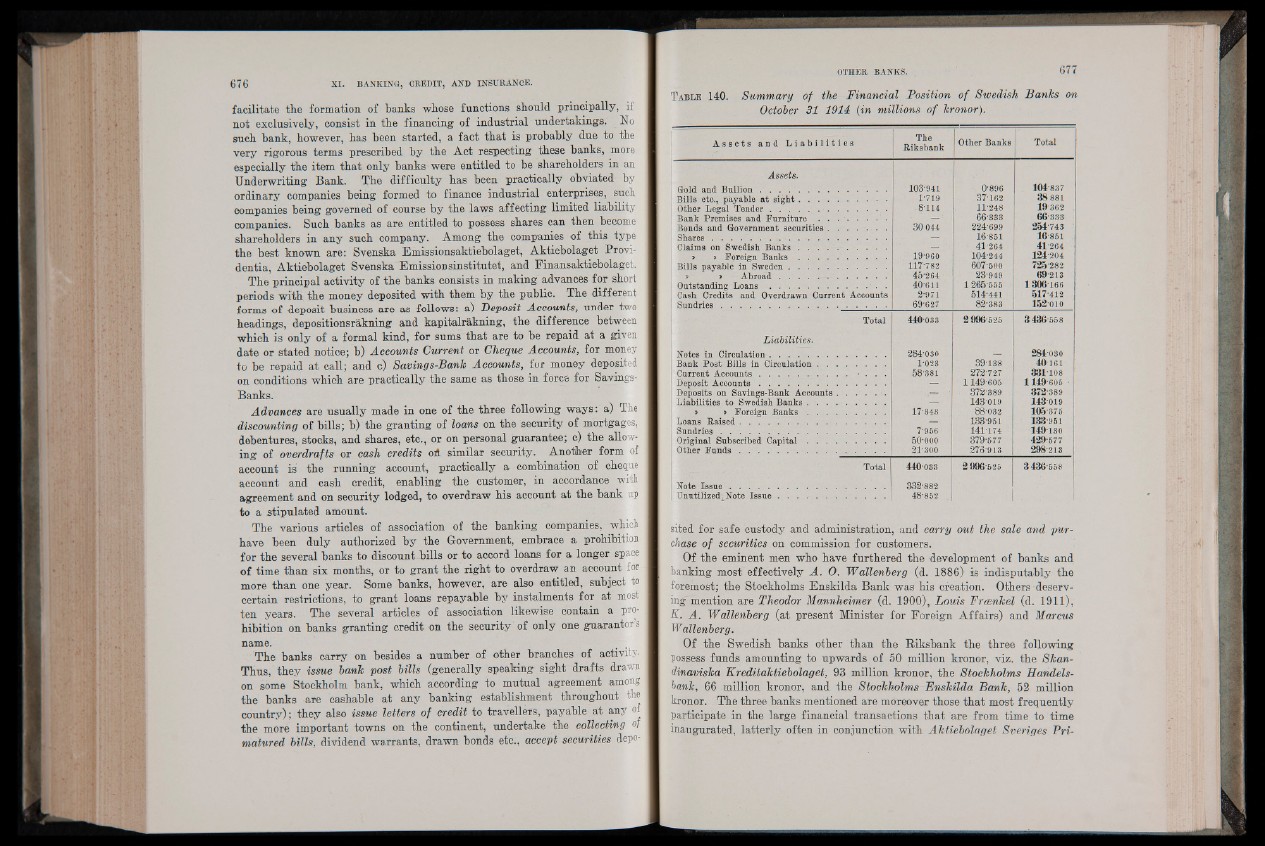
facilitate the formation of banks whose functions should principally, if
not exclusively, consist in the financing of industrial undertakings. No
such bank, however, has been started, a fact that is probably due to the
very rigorous terms prescribed by the Act respecting these banks, more
especially the item that only banks were entitled to be shareholders in an
Underwriting Bank. The difficulty has been practically obviated by
ordinary companies being formed to finance industrial enterprises, such
companies being governed of course by the laws affecting limited liability
companies. Such banks as are entitled to possess shares can then become
shareholders in any such company. Among the companies of this type
the best known are: Svenska Emissionsaktiebolaget, Aktiebolaget Provi-
dentia, Aktiebolaget Svenska Emissionsinstitutet, and Einansaktiebolaget.
The principal activity of the banks consists in making advances for short
periods with the money deposited with them by the public. The different
forms of deposit business are as follows: a) Deposit Accounts, under two
headings, depositionsrakning and kapitalrakning, the difference between
which is only of a formal kind, for sums that are to be repaid at a given
date or stated notice; b) Accounts Current or Cheque Accounts, for money
to be repaid at call; and c) Savings-Bank Accounts, for money deposited
on conditions which are practically the same as those in force for Savings-
Banks.
Advances are usually made in one of the three following ways: a) The
discounting of bills; b) the granting of loans on the security of mortgages,
debentures, stocks, and shares, etc., or on personal guarantee; c) the allowing
of overdrafts or cash credits ofl similar security. Another form of
account is the running account, practically a combination of cheque
account and cash credit, enabling the customer, in accordance with
agreement and on security lodged, to overdraw his account at the bank up
to a stipulated amount.
The various articles of association of the banking companies, which
have been duly authorized by the Government, embrace a prohibition
for the several banks to discount bills or to accord loans for a longer space
of time than six months, or to grant the right to overdraw an account for
more than one year. Some banks, however, are also entitled, subject to
certain restrictions, to grant loans repayable by instalments for at most
ten years. The several articles of association likewise contain a prohibition
on banks granting credit on the security of only one g u a r a n t o r s
name.
The banks carry on besides a number of other branches of activity-
Thus, they issue hank post hills (generally speaking sight drafts drawn
on some Stockholm bank, which according to mutual agreement among
the banks are cashable at any banking establishment throughout the
country); they also issue letters of credit to travellers, payable at any of
the more important towns on the continent, undertake the collecting of
matured hills, dividend warrants, drawn bonds etc:, accept securities depo-
Table 140. Summary of the Financial Position of Swedish Banks on
October 31 1914 (in millions of kronor).
A s s e t s a n d L i a b i l i t i e s The
Riksbank Other Banks Total
Assets.
GMd and B u llio n ....................................................
Bills etc., payable at s ig h t....................................
Other Legal T en d e r...............................................
Bank Premises and Furniture ............................
Bonds and Government securities........................
S h a re s ........................................................................
Claims on Swedish B a n k s ....................................
> > Foreign B a n k s ....................................
Bills payable in Sweden........................................
> > A b ro a d ...........................................
Outstanding L o a n s ........................................... .
Cash Credits and Overdrawn Current Accounts
103-941
1-719
■ 8-114
30 044
" 19-960
117-782
45-264
40-611
2-971
69-627
0-896
37-162
11-248
66-333
224-699
16-851
41-264
‘104-244
607-500
23-949
1265*555 -
514-441
82-383
104-837
38 881
19362 .
66-333
254-743 '
16-851 .
41-264
124-204
725-282
69-213
1306-166
517-412
152-010
Total 440-083 2996-525 3 436 558
Liabilities.
Notes in Circulation........................................
Bank Post-Bills in Circulation............................
Current Accounts............................... . . . . .
Deposit A c co u n ts............................................
Deposits on Savings-Bank Accounts...................
Liabilities to Swedish Banks................................
> > Foreign B a n k s ................................
Loans Raised...........................................................
Sundries ....................................................................
Original Subscribed C a p it a l ................................
Other F u n d s ....................... ...................................
284-080
1-023
58-381
17-343
7-966 ■ -
50 000
21-300
39-138
272-727
1149-605
372-389
143019
88-032
133-951
141-174
379-577
275-913
284-030
40 161
331-108
1149-605 •
372-389
143 019
105-375
133951
149-130
429-577
298-213
Total 440 033 2996-525 3436-558
Note I s s u e ................................................................
Unutilized, Note I s s u e ............................................
332-882
48-852 ;.'j
sited for safe custody and administration, and carry out the sale and purchase
of securities on commission for customers.
Of the eminent men who have furthered the development of banks and
banking most effectively A. 0 . Wallenberg (d. 1886) is indisputably the
foremost; the Stockholms Enskilda Bank was his creation. Others deserving'
mention are Theodor Mannheimer (d. 1900), Louis Froenkel (d. 1911),
K. A. Wallenberg (at present Minister for Foreign Affairs) and Marcus
W allenberg.
Of the Swedish banks other than the Riksbank the three following
possess funds amounting to upwards of 50 million kronor, viz. the Skan-
dinaviska Kreditaktiebolaget, 93 million kronor, the Stockholms Handels-
bank, 66 million kronor, and the Stockholms Enskilda Bank, 52 million
kronor. The three banks mentioned are moreover those that most frequently
participate in the large financial transactions that are from time to time
inaugurated, latterly often in conjunction with Aktiebolaget Sveriges Pri